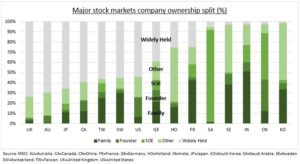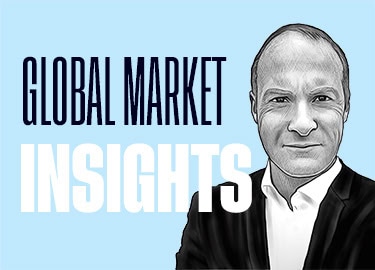OWNERSHIP: Company ownership matters and differs a lot around the world. Understanding the incentives and time frames of owners is important. It helps explain key investment issues, from the rise of governance and share buybacks to the valuation discount on many markets. Institutional investors and atomised shareholder bases dominate in the ‘Anglo-Saxon’ markets, even as passive investment flows surge. Whilst the State and Families are more important in Europe and especially emerging markets (EM). Differences are also very big across sectors.
DATA: MSCI sliced and diced ownership data on the world’s largest equity markets (see chart), and NYU Stern by industry. Nearly half (46%) of stocks globally are ‘controlled’ by someone. And this proportion is rising, not falling. There is also a wide range of ownership structures, from families and founders to state owned enterprises (SOE) and ‘others’ like big institutional investors and company cross holdings. The UK and Australia have the most widely dispersed ownership. Whilst Asia is more family focused. SOE’s are huge in China and Saudi Arabia. Europe sits in the middle. Sectors also differ. SOEs are big in energy and financials, founders across tech, families in consumer and real estate, whilst health care is the most widely held.
IMPLICATIONS: Types of corporate ownership matter, with governance now firmly on investor radars. The degree of dispersed ownership and focus on returns often drives valuation levels, share buyback activity, and impact of shareholder voting. This is an increasing focus as passive flows surge. Global ETFs are near $10 trillion of assets, double five years ago. High levels of SOE ownership been an ingredient in EM’s valuation discount. Whilst founder ownership and super-voting rights a focus from US to China. See our company ESG scores and proxy voting.

All data, figures & charts are valid as of 02/02/2023



